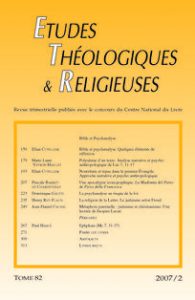Quels rapports établir entre une fonction paternelle que le psychanalyste Jacques Lacan écrit « Nom-du-Père » et une nomination religieuse de Dieu comme Père ? Pour aborder cette question, Jean-Daniel Causse analyse la façon dont le judéo-christianisme se trouve en toile de fond de la compréhension lacanienne du « Père ». Reprenant d’abord le mythe freudien de la mort du « Père », il l’articule avec l’impossible nomination de Dieu dans le judaïsme. Il montre ensuite comment le christianisme ouvre sur une nouvelle nomination de Dieu comme « Père » à partir d’une théologie de l’incarnation, c’est-à-dire de Dieu comme « Fils ». La notion chrétienne du Dieu-Père permet de comprendre certains aspects de la spécificité de Lacan par rapport à l’héritage de Freud.
How does Jacques Lacan’s « Name-of-the-Father » (Nom-du-Père) relate to the religious naming of God as Father ? To answer this question Jean-Daniel Causse examines how Lacan’s Judeo-Christian background informs his understanding of the « Father ». Reinterpreting the Freudian myth of the death of the « Father », he connects it with the impossible naming of God in Judaism and shows how Christianity gives way to a new naming of God as « Father » starting with the theology of the Incarnation, i.e., God as the « Son ». The Christian notion of God-the-Father explains some of the specific features in Lacan’s reception of Freud’s intellectual heritage.
p. 249-266
Auteur
CAUSSE Jean-Daniel
Jean-Daniel CAUSSE (1962-2018) a été professeur d'éthique à l'Institut protestant de théologie, Faculté de Montpellier, puis professeur au département de psychanalyse de l'université Paul-Valéry Montpellier 3 et directeur du Centre de recherches interdisciplinaires en sciences humaines et sociales (CRISES - EA 4424).
